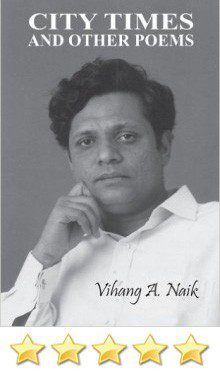Vihang Naik’s book City Times and Other Poems was first published in 1993 and has been republished in 2014 by Author House UK Ltd.
Why is this significant? Well if you do the maths, it reveals the writing to be that of a young man. Reading the poems, they present as the musings of a romantic young person cataloguing a journey from innocence to cynical acceptance of the duplicitous nature of love and humanity, rather than mature poems of an Indian academic. This serieo be spurred in Western poetics, especially in the work of male poets.
The book contains only six poems, but each of these, with the exception of Self Portrait, is divided into seven or eight cantos. The first three poems employ unrhymed couplets in seven cantos. Self Portrait seems to break up the book, leaving two more poems, this time with eight cantos and, although still unrhymed, variance in line breaks and use of negative space.
The book in fact is set out with a large amount of negative space and blank pages separating works, inviting the reader to  take time, to meditate, pause between poems and weigh each word to see its true measure. Does the poet expect too much of his reader in choosing to set out his work in this fashion?
take time, to meditate, pause between poems and weigh each word to see its true measure. Does the poet expect too much of his reader in choosing to set out his work in this fashion?
Self Portrait is an example of this. This brief five line poem has five blank pages between its beginning and its one line ending. Here the division between poetry and art is blurred. Perhaps we can draw our own self portraits on the empty pages. Perhaps it is a little overdone.
On the other hand, Naik’s other poems are less stilted. Love Song of a Journeyman conveys the fleeting joy and betrayal of love, taking the reader through the tantalizing electricity of first flirtation to the dry ink on the pages of a letter sent from a city far away.
Mirrored Man is a strong poem, a commentary on the ways of people. The last canto makes clear what is hinted at in the other sections of the piece where the actions of man are mirrored with those of spider, crab, chameleon – and man comes off the worse for such comparisons.
Truth is a mirror
he has lost.
Path of Wisdom is a poem for meditation, somewhat reminiscent of the mystical writing of Julian of Norwich.
……consider words,
their limitation
then leave yourself
with silence
The pieces in At the Shore are drawn together by sea images. Some parts are stronger than others. Desire is immediate and visual
the octopus
of desire
……………..
tears flesh apart.
whereas in Voice and Pleasure images are more labored. Eyes is the only poem in this canto with no water imagery but one cannot ignore the beauty of the lines
the day admits
nothing
of its own
uncertainties
In the last poem City Times the writer’s innocence has passed and he reflects on how he has been shaped and changed. The city, with its complexities, is used to reflect on the complexities and skeletons now abiding within the poet.
Sometimes, as is known, the English language lacks the subtlety of mood of other languages. It does not have the range of inflection or masculine, feminine form that can alter the meaning of a piece allowing infinitesimal changes to interpretation. Also, there are just cultural differences in the way writers think and convey meaning, even if the same language i.e. English, is employed as the tool for communication. This is said, as, at times Naik’s imagery can become confusing and scattered, giving no relief for the reader, making the puzzle too hard. An example of this is in the beginning poem from City Times
…….he had refused
to learn from men
parting
member’s name
in one sentence
i saw my face
multiplied
in
a broken
mirror
But this is the exception rather than the rule. For the most part Naik stays true to his vision of what poetry is about and what is should strive to achieve. He has totally moved away from forced rhyming or the traditionally followed practices of his culture. He strives in his work to bring about a fusion of thought and feelings, to reach communication beyond the bounds of language.
Since the writing of City Times and Other Poems, Vihang Naik has had other books published including: a Gujarati language collection of poetry Jeevangeet published by Nacbharat Sahitya Mandir; Making a Poem published by Allied Publishers and Poetry Manifesto published by Indialog Publishers Pty. Ltd. Naik has a strong following of admirers in the North Gujarat region of India, where he is employed as a translator and a teacher of English.
In this volume of work Naik cleverly combines divergent images and ideas uniting them with the overall theme of the necessary practice of meditative reflection on life and the use of poetry to facilitate this. There will possibly be one part that appeals more to you. For me, it is the series of cantos in At the Shore. Delve into this volume and discover which one sings for you.
City Times and Other Poems is available for purchase on Amazon – http://www.amazon.com/City-Times-Other-Poems-Vihang-ebook/dp/B00J2PMXXG. It is a book that must be read more than once for, at each re-reading, more depth is found in a seemingly light collection.
Indian Review | Reviewer Profile | Janette DADD has two books of poetry Eve’s Tears and Early Frosts published by Ginninderra Press. She has previously reviewed brb by Maree Dawes and sweetened in coals by Phillip Gijindarraji Hall.) She studied Psychology and Linguistics at Macquarie Univesity , New South Wales , Australia and taught in Schools in Australia.






Leave a Reply